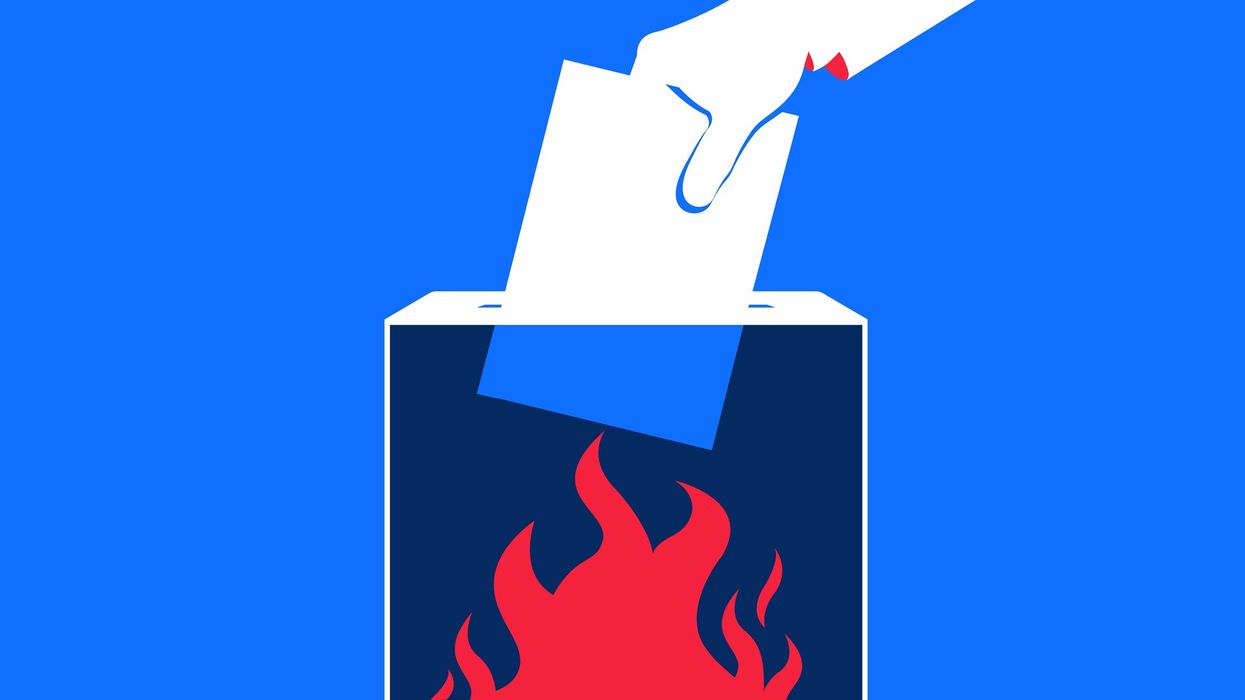
Moor Studio/Getty Images

A new Heartland-Rasmussen survey further illustrates how wildly polarized America has become, but it also raises key concerns about the security of U.S. elections.
A new survey by the Heartland Institute and Rasmussen Reports shows that more than one in four likely voters say they would break election laws in the 2024 election, “if given the opportunity.” The results raise serious questions not only about political polarization in America but also whether the country’s election laws are secure enough to stop illegal voting in the next election and beyond.
The Heartland-Rasmussen poll asked 1,467 likely voters whether they plan to vote for Joe Biden, Donald Trump, Robert F. Kennedy Jr., or some other candidate. It then asked respondents a series of questions about illegal voting behaviors. Many of the questions were written specifically to gauge voters’ willingness to undermine the candidate they view as their primary opponent.
If voters are willing to cheat, lawmakers must enact policies to stop them.
For example, one question asked, “If given the opportunity, would you cast a ballot in two different states to help stop [Joe Biden / Donald Trump] from being re-elected as president?”
Another asked, “If given the opportunity, would you throw out or destroy a mail-in ballot belonging to a friend or family member, without their knowledge, to help stop [Joe Biden / Donald Trump] from being re-elected as president?”
Questions also asked voters whether they would fill out and sign the ballot of a friend or family member, give another voter incorrect information about the place or time of the election, secretly alter another voter’s mail-in ballot, or offer to “pay or reward another voter” to influence his or her decision. All these actions violate federal and state election laws.
The results of the survey are nothing short of stunning: 28% of voters said they would be willing to engage in at least one form of illegal voting. If that’s an accurate reflection of the entire voting population, it would amount to more than 44 million voters, based on 2020 voter turnout data.
Perhaps most surprisingly, there was very little difference between voters’ political affiliations and their willingness to cheat: 32% of Democrat respondents said they would be willing to cheat, compared to 28% of Republicans and 24% of “other” voters.
Trump voters (29%) were slightly more likely than Biden voters (27%) to say they would break election rules, clearly indicating that there is a willingness to cheat on both sides.
One demographic characteristic that stood out was the age of the respondent in the survey. More than half of voters ages 18-39 said they would be willing to break election rules, compared to just 20% of those ages 40-64 and 15% of voters ages 65 or older.
The Heartland-Rasmussen survey further illustrates how wildly polarized America has become, but it also raises key concerns about the security of U.S. elections.
Most of the questions in the survey asked about behavior related to mail-in balloting, which has become significantly more common since the outbreak of COVID-19 in 2020.
According to a study by the National Conference of State Legislatures, 28 states allow “no-excuse” mail-in balloting, which means voters don’t need to have a special reason to vote by mail, such as a physical disability.
Another eight states conduct their elections primarily by mail: California, Colorado, Hawaii, Nevada, Oregon, Utah, Vermont, and Washington.
More importantly, every one of the most important 2024 swing states — Arizona, Georgia, Michigan, Nevada, Pennsylvania, and Wisconsin — allows no-excuse mail-in voting or has a vote-by-mail system.
Some states say that they protect against absentee ballot fraud by requiring signature verification. But the Heartland-Rasmussen survey shows that voters are willing to cheat in ways that wouldn’t be caught by signature verification.
For example, the survey asked, “If your spouse or another trusted family member gave you permission to fill out and sign their mail-in ballot, allowing you to use their ballot to vote for anyone that you choose, would you?” Eighteen percent of respondents answered “yes.”
Under such a scenario, a person might be able to replicate the signature of a spouse well enough that it wouldn’t be caught by election officials. However, even if officials were to flag the signature as suspicious, in many cases, states ask the voter before tossing out a ballot. Unless a voter is willing to admit his or her spouse broke election laws, there would be no way for officials to know that the ballot was filled out illegally.
There are two solutions to these concerns. First, states could require that able-bodied, in-state residents vote in person, not by mail.
Second, states could require that mail-in voters have their signatures verified by a notary. Notaries are readily available, often for free, at banks and other institutions. Many government buildings have one or more notaries as well.
Currently, only three states — Mississippi, Missouri, and Oklahoma — require a notary for absentee ballots.
Free and fair elections are the bedrock of a democratic republic. If voters are willing to cheat, as the recent Heartland-Rasmussen survey shows, lawmakers must enact policies to stop them. Unfortunately, that has yet to happen.
Justin Haskins